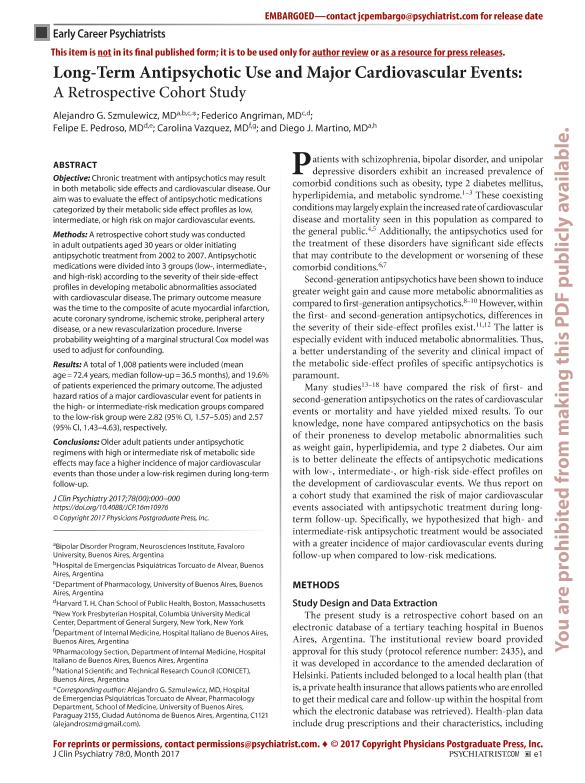Mostrar el registro sencillo del ítem
dc.contributor.author
Szmulewicz, Alejandro G.
dc.contributor.author
Angriman, Federico
dc.contributor.author
Pedroso, Felipe E.
dc.contributor.author
Vázquez, Carolina

dc.contributor.author
Martino, Diego Javier

dc.date.available
2018-06-07T20:17:04Z
dc.date.issued
2017-10
dc.identifier.citation
Szmulewicz, Alejandro G.; Angriman, Federico; Pedroso, Felipe E.; Vázquez, Carolina; Martino, Diego Javier; Long-Term Antipsychotic Use and Major Cardiovascular Events; Physicians Postgraduate Press; Journal Of Clinical Psychiatry; 78; 8; 10-2017; e905-e912
dc.identifier.issn
0160-6689
dc.identifier.uri
http://hdl.handle.net/11336/47769
dc.description.abstract
Objective: Chronic treatment with antipsychotics may result in both metabolic side effects and cardiovascular disease. Our aim was to evaluate the effect of antipsychotic medications categorized by their metabolic side effect profiles as low, intermediate, or high risk on major cardiovascular events.Methods: A retrospective cohort study was conductedin adult outpatients aged 30 years or older initiating antipsychotic treatment from 2002 to 2007. Antipsychotic medications were divided into 3 groups (low-, intermediate-, and high-risk) according to the severity of their side-effect profiles in developing metabolic abnormalities associated with cardiovascular disease. The primary outcome measure was the time to the composite of acute myocardial infarction, acute coronary syndrome, ischemic stroke, peripheral artery disease, or a new revascularization procedure. Inverse probability weighting of a marginal structural Cox model was used to adjust for confounding.Results: A total of 1,008 patients were included (meanage = 72.4 years, median follow-up = 36.5 months), and 19.6% of patients experienced the primary outcome. The adjusted hazard ratios of a major cardiovascular event for patients in the high- or intermediate-risk medication groups compared to the low-risk group were 2.82 (95% CI, 1.57?5.05) and 2.57 (95% CI, 1.43?4.63), respectively.Conclusions: Older adult patients under antipsychotic regimens with high or intermediate risk of metabolic side effects may face a higher incidence of major cardiovascular events than those under a low-risk regimen during long-term follow-up.
dc.format
application/pdf
dc.language.iso
eng
dc.publisher
Physicians Postgraduate Press

dc.rights
info:eu-repo/semantics/openAccess
dc.rights.uri
https://creativecommons.org/licenses/by-nc-sa/2.5/ar/
dc.subject
Severe Mental Disorders
dc.subject
Cardiovascular Event
dc.subject
Antipsychotics
dc.subject.classification
Medicina Critica y de Emergencia

dc.subject.classification
Medicina Clínica

dc.subject.classification
CIENCIAS MÉDICAS Y DE LA SALUD

dc.title
Long-Term Antipsychotic Use and Major Cardiovascular Events
dc.type
info:eu-repo/semantics/article
dc.type
info:ar-repo/semantics/artículo
dc.type
info:eu-repo/semantics/publishedVersion
dc.date.updated
2018-06-07T14:22:45Z
dc.journal.volume
78
dc.journal.number
8
dc.journal.pagination
e905-e912
dc.journal.pais
Estados Unidos

dc.journal.ciudad
Memphis
dc.description.fil
Fil: Szmulewicz, Alejandro G.. Universidad Favaloro; Argentina. Gobierno de la Ciudad de Buenos Aires. Hospital de Emergencias Psiquiáicas "Torcuato de Alvear"; Argentina. Universidad de Buenos Aires; Argentina
dc.description.fil
Fil: Angriman, Federico. Universidad de Buenos Aires; Argentina. Harvard T. H. Chan School of Public Health; Estados Unidos
dc.description.fil
Fil: Pedroso, Felipe E.. Harvard T. H. Chan School of Public Health; Estados Unidos. Columbia University Medical Center; Estados Unidos
dc.description.fil
Fil: Vázquez, Carolina. Hospital Italiano; Argentina
dc.description.fil
Fil: Martino, Diego Javier. Consejo Nacional de Investigaciones Científicas y Técnicas; Argentina. Universidad Favaloro; Argentina
dc.journal.title
Journal Of Clinical Psychiatry

dc.relation.alternativeid
info:eu-repo/semantics/altIdentifier/doi/https://dx.doi.org/10.4088/JCP.16m10976
dc.relation.alternativeid
info:eu-repo/semantics/altIdentifier/url/http://www.psychiatrist.com/JCP/article/Pages/2017/v78n08/16m10976.aspx
Archivos asociados
